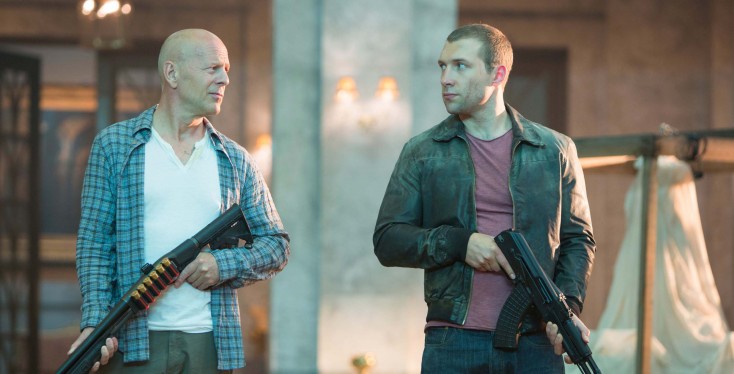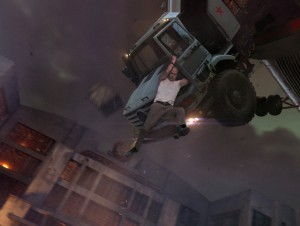By ANGELA DAWSON
Front Row Features
HOLLYWOOD—What could be more romantic than taking a date to see Bruce Willis outrun bad guys in car chases, dodge machine gun fire from an attacking helicopter and inexplicably escape radiation poisoning at Chernobyl in “A Good Day to Die Hard,” the fifth installment in the long-running action movie franchise?
As New York cop John McClane, he goes to Russia looking for his estranged adult son, Jack (played by Jai Courtney) and finds a whole lot of trouble in the process.
Having originated the unstoppable hero 25 years ago with “Die Hard,” and having last played him six years ago, Willis says it was time for another go as McClane. For the first time, the quintessentially American lawman goes abroad.
Though he may have less hair and a few more wrinkles than he did when he first uttered “Yippee ki-yay, Mother******,” Willis remains in top shape and proves that at age 57 he can still take a punch, get knocked around and end up victorious.
A father of four daughters, Willis welcomed the opportunity to interact with a grown son onscreen.
Q: You look so fit in this. What is the difference doing those stunts from the ones you did 25 years ago?
Willis: The difference between trying to be fit and not being fit is the difference between life and death. I just made that up. (He chuckles.) There is no life and death in “Die Hard.” There is only life. We have really highly technical stunt persons now who came up safe and even though it looks like we leapt out of the 110th floor of a hotel, we’re OK. Jai, not so much. Apparently, he still is hearing ringing in one of his ears. No, really, they keep us safe. There’s not a tremendous difference. It’s a very simple difference. I get up a little slower from the ground after I’ve fallen. (But) it’s OK. I’m doing all right. I’m here today.
Q: What made you feel it was time for another “Die Hard?” And do you ever think about bringing Bonnie Bedelia (who played his wife in the first two “Die Hards”) back?
Willis: I always think about Bonnie and having her back. Those things, unfortunately, are out of my hands. It has to do with the story. We only do another “Die Hard” when they have a really complicated title that no one really understands. (He chuckles.) We’d just gotten to where we thought we might understand (the fourth installment) “Live Free or Die Hard,” and now we have “A Good Day to Die Hard,” which I have to be honest with you, I’m a little baffled by, but it’s a good movie. They’re both good movies. You have to come up with a story—that’s the thing that triggers another film. This film was much more germane to the “Die Hard” franchise in that it has to do with family and family conflict. That’s always been a high-ticket number with “Die Hard.”
Q: After 25 years, what do you like about your character?
Willis: Over the past 25 years, there has been a certain amount of goodwill that has been visited on these films. People root for you and people want to see you because you know someone like me. (I’m) someone who thinks he’s too smart or has everything figured out, but in truth you don’t really have anything figured out. And now, we have my son who thinks that he knows everything and has everything figured out, but no one here and no one on Earth really has everything figured out. It’s fun to watch people try and figure it out and try and get out of each other’s way. Along the way, (director) John Moore and his team make it so harrowing, with the car chase and the stunts—all those things that we did. It’s the same effect as going to an amusement park and going on a roller coaster. You know you’re not going to fall off the roller coaster but it sure seems like you’re going to go flying out the car. These films are like big entertainment roller coasters. That’s the goal anyway. That’s my goal.
Q: Audiences wait in anticipation for you to say your catchphrase in every new “Die Hard” movie. Is it already in the script or do you have to figure out where it’s going to be? And what is the origin?
Willis: It was an ad-lib. Alan Rickman from the first film, the bad guy, he was such a good bad guy, he was constantly picking on me and he said something to me and I just happened to let that line slip out. It just became part of the fabric of the film. Now when we say it, (director) John (Moore) had an idea we should say it right away and get it out of the way. We tried that but… It always comes at a moment of high danger. It’s just amazing to me that that line has lasted this long. Kids say it to me on the street. Grandmoms. Football players. It’s a little awkward. I’m happy that they say it.
Q: John McClane is one of the greatest screen characters in film history. Can you talk about playing a character over such a long time and getting to develop that arc?
Willis: That stretch of time is pretty large. It’s hard to compress it into a few sentences. I remember every film and everything that we did and where we were. It is a life in itself; 25 years is a life in itself. I have really great memories of it and it’s all been good. As crazy as it is and as crazy as they continue to make these films, (we’ve) not (had) many injuries, not many people get hurt. It’s always good. I have a warm place in my heart for “Die Hard.” I’m glad you like it.
Q: Can you talk about how you draw on being a father for this role?
Willis: It’s my favorite job—being a father. I have four girls now. They’re a captive audience. They can’t really run away from you even if they don’t like your jokes. I just enjoy it— making my kids laugh and I still do. I do the dumbest things in the world to make my kids laugh. With my youngest (Mabel, 10 months), I try to make her laugh. One is a job, a film concept; the other is real life and you want to try and get them ready to go out in the world and be women who have good morals and good intentions and are nice people and are kind. I never knew until they got older that I was having any impact on them.
Q: This is the first time that you’ve had an adult son in a film. Being the father of four girls, what was that dynamic for you and how much did you enjoy it?
Willis: I just remember it being fun. I think I was just an OK dad for most of my life with my character and son Jack. We really set some obstacles for ourselves that we did not have a very good relationship. I thought he was a gangster and in much worse trouble than he happened to be in Moscow.
Q: Throughout these “Die Hard” movies, we see John McClane get very battered and see a lot of blood come out of his body. So after “A Good Day to Die Hard,” how many pints of blood do you think are left in John McClane’s body?
Willis: Well we’re up to liters now. (He chuckles.) Sometimes you actually get a little scratch on you or you get kicked. I think in the last one I got kicked in the head pretty early in the morning one day and had to get some stitches. I hardly ever bleed.
Q: What was the experience like bringing John McClane to Russia (and Hungary)? What challenges did that bring to the character and the experience of filming at this new location?
Willis: Moscow was really built for a couple of fish-out-of water (types) like us. I can’t imagine a bigger ocean of non-communication than Eastern Europe and Russia. I think we were all excited about the idea of getting out of the United States and having the film be more international. I don’t speak any other languages really, and we got a couple jokes out of that. I like seeing myself not being able to figure things out and not being able to figure out how the car works and not being able to know what someone is saying to me. I can hardly understand English so trying to shoot in Moscow (was interesting).
Q: What is the secret of the longevity of the “Die Hard” franchise?
Willis: I have had the opportunity lately to think of action movies and how they compare and compete with one another but I have come to this understanding: I don’t compete with anyone; I compete with myself. I just try to improve my work and do better than I did the last time. I’m not really competing with (my other films) “Moonrise Kingdom” or “Looper” or any other film. I just try and make it look like I believe what I’m saying in the film. I’m a big film fan. I still go and see films. I go and see actions films and comedies and all kinds of weird things. There is no competition. I’ve been talking these last couple days and how it feels to be in a film that has stretched over 25 years. You can only see that from the end of it. No one knew at the beginning that we’d be doing five of these films. It’s an honor, a strange, great honor, to still be able to run down the street and do what we do and make it look fun, scary and interesting and still have the core of the character.






